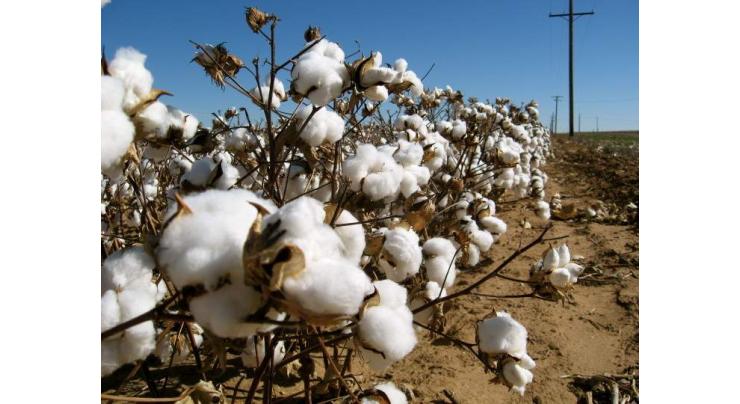
Experts Introduce Strategies For Cotton Crop Production
Rukhshan Mir (@rukhshanmir) Published November 03, 2016 | 01:40 PM

ISLAMABAD, Nov 3 (UrduPoint / Pakistan Point News - 03rd Nov, 2016 ) : Highlighting the importance of reducing dependence on water for crop production, the agriculture experts here Thursday introduced various methods to reduce water usage in different conditions.
They were speaking at an open Session of the 75th Plenary Meeting of the International Cotton Advisory Committee (ICAC), entitled "Reducing the Water Footprint of Cotton." Globally, 71% of water withdrawals are used in agriculture, while in Pakistan (where cotton is the predominant crop) this figure reaches 94%, so this is a pressing issue, they said.
An expert from Sudan, Dr. S. Hassan Ahmed, informed the participants about various techniques to reduce water usage, saying that implantation of new irrigation systems; reduction of conveyance losses; implementation of precision agriculture (water management) and use of deficit irrigation would help minimize water usage.
He also highlighted the importance of optimization of irrigation through irrigation scheduling models; use of in-situ rain water harvesting and conservation tillage techniques. He was of the view that breeding for high-yielding drought- resistant varieties; and genetic engineering would also help reduce water usages.
He emphasized that free or nominal water prices do not encourage efficient water use and that water should be priced according to volume (quantity) applied and not area.
On the occasion, an another expert from the World Wildlife Fund, Arif Makhdum, said Sustainable Agriculture Program was being implemented in Pakistan's seven regions, with 92,350 farmers engaged in five projects in an area of 355,600 hectares.
In Pakistan, cotton is 100% irrigated and surface or ground water is estimated to account for 56% of the total water footprint. He said the water footprint assessment helped in identifying potential and important cotton production zones and indicating ways to increase water use efficiency, while reducing contaminants in water caused by fertilizer/pesticide applications.
These programs resulted in a 25% reduction in water usage, a 31% reduction in pesticide use, 27% less synthetic fertilizer use and an increase in net profit of 24%, he added. Danilar Andakulov, of Helvetas, Kyrgyzstan, informed the participants about the implementation of six projects in four countries (India, Pakistan, Kyrgyzstan and Tajikistan) in rice and cotton.
Technologies promoted in project countries include using short furrows,irrigating every second furrow, alternating furrow irrigation, laser leveling of furrows, and soil humidity measurement. Improved methods of irrigation have resulted in 33% less of water use and 35% better yield compared with traditional methods.
Innovative methods of irrigation led to substantially higher income per hectare of production.
Related Topics
Recent Stories

Experts raise concerns over introduction of 10-stick packs

Iranian president arrives in Karachi

Law Minister expresses Govt's resolve to address issue of missing persons

Rizwan’s batting order may be changed: Sources

Nawaz Sharif to visit Guangzhou exhibition in China

FM Dar not traveling to China: Foreign Office

PM takes notice of deliberate delay in tax cases

Iranian President visits Allama Iqbal’s mausoleum

Iranian President arrives in Lahore today

Currency Rate In Pakistan - Dollar, Euro, Pound, Riyal Rates On 23 April 2024

Today Gold Rate in Pakistan 23 April 2024

Islam enlightened world with its teachings about knowledge: Dr Jamileh
More Stories From Pakistan
-
Delegation of Girls Guide Association visits Virtual Women Police Station
6 minutes ago -
Govt's priority to protect life, property of people: DC
16 minutes ago -
DC directs cleaning of drains ahead immediately ahead of rain
16 minutes ago -
AJK Govt releases long awaited funds for local councils
16 minutes ago -
Punjab govt wants to address travelling problems of student through motorbike scheme: minister
25 minutes ago -
Mirpurkhas to observe World Immunization Week
26 minutes ago
-
Rs.788.8m fine imposed on 7523 electricity thieves, 6159 arrested in 227 days: FESCO spokesman
26 minutes ago -
International vloggers witness National Assembly session
26 minutes ago -
SSGCL to suspend gas supply in Balochistan on April 24 to repair pipelines
35 minutes ago -
Ayaz reaffirms resolve to further deepen fraternal Pak-Saudi ties
35 minutes ago -
Man arrested over grabbing land through fake stamp paper
36 minutes ago -

Iranian president arrives in Karachi
37 minutes ago
